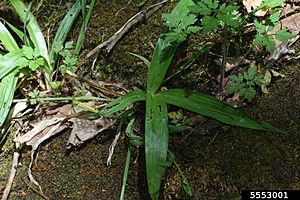White Bear sedge facts for kids
Quick facts for kids White Bear sedge |
|
|---|---|
 |
|
| Scientific classification | |
| Kingdom: | |
| (unranked): | |
| (unranked): | |
| (unranked): | |
| Order: | |
| Family: | |
| Genus: | |
| Section: |
Laxiflorae
|
| Species: |
C. albursina
|
| Binomial name | |
| Carex albursina E. Sheld.
|
|
| Synonyms | |
|
Carex laxiflora var. latifolia Lam. |
|
Carex albursina is a special type of plant called a sedge. It's also known as the White Bear sedge or blunt-scaled wood sedge. Sedges look a bit like grasses, but they have solid stems, often with three sides. This plant has wide leaves and grows in forests in eastern North America.
Discovering the White Bear Sedge
How It Got Its Name
The White Bear sedge got its name from White Bear Lake in Minnesota. A scientist named Edmund Sheldon found this plant near the lake in the 1890s. He was the first to officially describe it.
Where It Lives
This sedge likes to grow in damp forests. You can find it in "deciduous" forests, where trees lose their leaves in the fall. It also grows in "mixed woods," which have both deciduous and evergreen trees. Its home is mainly in the eastern parts of North America.
What It Looks Like
The leaves of the White Bear sedge are quite wide. They can be about 10 to 38 millimeters (or 0.4 to 1.5 inches) across. These leaves can also grow fairly long, reaching 10 to 35 centimeters (about 4 to 14 inches) in length.

